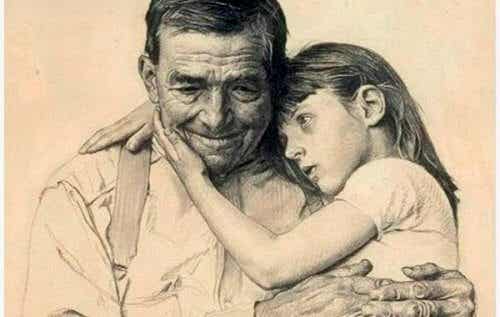
Last update: Augusts 22, 2016
Grandparents never die: they become invisible and sleep forever in the deepest part of our heart. We still miss them today and we would give anything to hear their stories again, to receive their caresses, to see those looks full of infinite tenderness.
We know that life works like this: while grandparents have the privilege of seeing us born and grow up, we must be witnesses of their aging and their farewell to the world. Their loss is almost always the first goodbye we faced in childhood.
Grandparents who participate in the education of their grandchildren leave traces in their souls, a legacy that will accompany them for the rest of their lives, like the seeds of an imperishable love that will be noticed even more when they are invisible.
It is very common nowadays to see grandparents engaged in raising their grandchildren. They are an invaluable support point for current families. However, their role is not like that of a father or a mother, which is immediately understood by children.
The bond between grandparents and grandchildren is created through a much more than intimate and profound complicity; for this reason, their loss can mean a very sensitive event in the mind of a child or teenager. We invite you to reflect on this topic with us.
Saying goodbye to grandparents: the first loss
Many people have the privilege of being with one or more grandparents even in adulthood. Others, on the other hand, had to face their death at an early age, an age in which loss is not yet understood in all its realism, especially because adults explain it badly. They try to sweeten death or make it painless.
Most educational psychologists say clearly that a child must always be told the truth. Obviously it is necessary to adapt the message at his age, but a mistake often made by mothers and fathers is to spare their children the last goodbye to their grandfather in the hospital or to use metaphors such as "grandfather flew to a star" or "grandmother is now sleeping in sky".
- Death must be explained to children clearly and without metaphors, so that they do not get the wrong idea. If we tell them that their grandfather is gone, it is very likely that he wants to know when he will be back.
- If we explain death to little ones through a religious view, it is necessary to insist that that person will not return. A child is able to absorb a limited amount of information, so the explanation we will give should be as short and simple as possible.
It is also important to remember that death is not a taboo and it is not necessary to hide the tears of adults from the eyes of children. We all suffer from the loss of a loved one and it is necessary to talk about it and let off steam. Even children will do it when the time comes, so we must be wise and facilitate this process for them.
Children will ask us a lot of questions and need the best and most patient answers. The loss of grandparents in childhood or adolescence is always difficult, so it is necessary to live this grief in the family, paying close attention to the needs of our children.
Even if they are gone, they are there
Although they are no longer there, grandparents are present in our lives, in the daily scenarios we share with our family and also in the oral inheritance that we offer to the new generations, to the new grandchildren and great-grandchildren who have not been able to know them.
Grandparents held hands for some time while they taught us to walk, but they have never stopped supporting our hearts, the place where they will sleep forever, offering us their light and their memory.
Their presence is still alive in those black and white photos, kept in order in the family albums, certainly not in the memory of a mobile phone. The grandfather is near the tree he planted with her hands, the grandmother is wearing that hand-sewn dress that we still have ...
The presence of grandparents lies in the smell of pastels that lies in our emotional memory; it is in every advice they have given us, in every story they have told us; it's in the way we tie our shoes; it is in the shape of the chin that we inherited from them.
Grandparents do not die, because they are transcribed in our emotions in a more delicate and profound way than the banal genetics. They taught us to go slowly, at their own pace, to savor the afternoons in the countryside, to discover that beautiful books have a special smell, because there is a language that goes beyond words.
It is the language of a hug, a caress, a complicit smile and a walk in the late afternoon while, silently, we watch the sunset together. These things will last forever and this is the true eternity of people: the loving legacy of those who truly love us and those who honor us by remembering us every day.


























